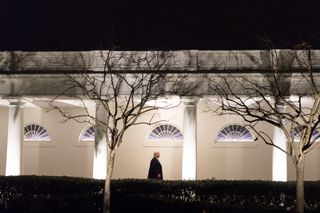White House Won't Share AT&T-TW Related Trump Communications

The White House has refused to turn over communications about the AT&T-Time Warner merger to a pair of powerful Democratic House members.
In a letter to Rep. Jerry Nadler, chairman of the Judiciary Committee, and David Cicilline, chairman of the Antitrust Subcommittee, White House counsel Pat Cipollone invoked executive privilege in denying the communications between President Donald Trump and his advisors.
Cipollone said that while he will accommodate info requests for "legitimate legislative purpose," that does not extend to providing protected communications between the President and his most senior advisors.
On March 7, the legislators wrote to the White House asking for the info after a New Yorker article suggested the President had tried to pressure the Department of Justice to block the merger of AT&T-Time Warner. Something that had been suggested by supporters of the deal given the President's attacks on Time Warner-owned CNN while on the campaign trail. He said flatly his Administration would block it.
The New Yorker cited a single, "well-informed," source that the President "ordered" Gary Cohn, director of the National Economic Council, to pressure DOJ to intervene, though Chief of Staff John Kelly reportedly told Cohn not to do so.
Cipollone pointed out that the President has an "important role" in the area of antitrust, including the prerogative not to enforce a law or enforce it in a certain way. Justice chose to conclude the AT&T-Time Warner deal was a sufficient threat to competition to sue to block it rather than try to apply conditions.
Antitrust chief Makan Delrahim has said he was not pressured to make the decision to block the deal, which two courts, a district and a federal appeals court, declined to do.
Broadcasting & Cable Newsletter
The smarter way to stay on top of broadcasting and cable industry. Sign up below
The Justice Department got a similar letter, and Cipollone said Nadler and Cicilline should be hearing from it "in due course," though it is unlikely DOJ will provide a different answer or the documents.
Among those who apparently had concerns about a political motivation to the suit is new Attorney General William Barr, a former member of the Time Warner board who challenged Delrahim's characterization of a meeting about the deal where Barr was also in attendance.
Barr said in an affidavit that Delrahim's version was "inaccurate and incomplete," and that his discomfort at that meeting stemmed from Barr's concerns that "Mr. Delrahim's position about the alleged harms from the merger and his inexplicable...rejection of remedies short of extreme divestitures were the product not of a well-versed substantive analysis, but rather political or other motivation."
During his confirmation hearing for the post, Barr was asked what he meant by that and whether it was the President's historic antipathy toward CNN, which is owned by Time Warner. Barr said he was not sure why the antitrust division acted the way it did, but did say that what he meant was that he was concerned that the department "was not engaging" with some of the companies' arguments.
FCC chair Ajit Pai has said he did get a call from White House General Counsel Don McGahn about the status of the merger review, but that McGahn did not try to influence his decision, which, in any case he suggested, was and would have been based on the facts and the law.
Contributing editor John Eggerton has been an editor and/or writer on media regulation, legislation and policy for over four decades, including covering the FCC, FTC, Congress, the major media trade associations, and the federal courts. In addition to Multichannel News and Broadcasting + Cable, his work has appeared in Radio World, TV Technology, TV Fax, This Week in Consumer Electronics, Variety and the Encyclopedia Britannica.

